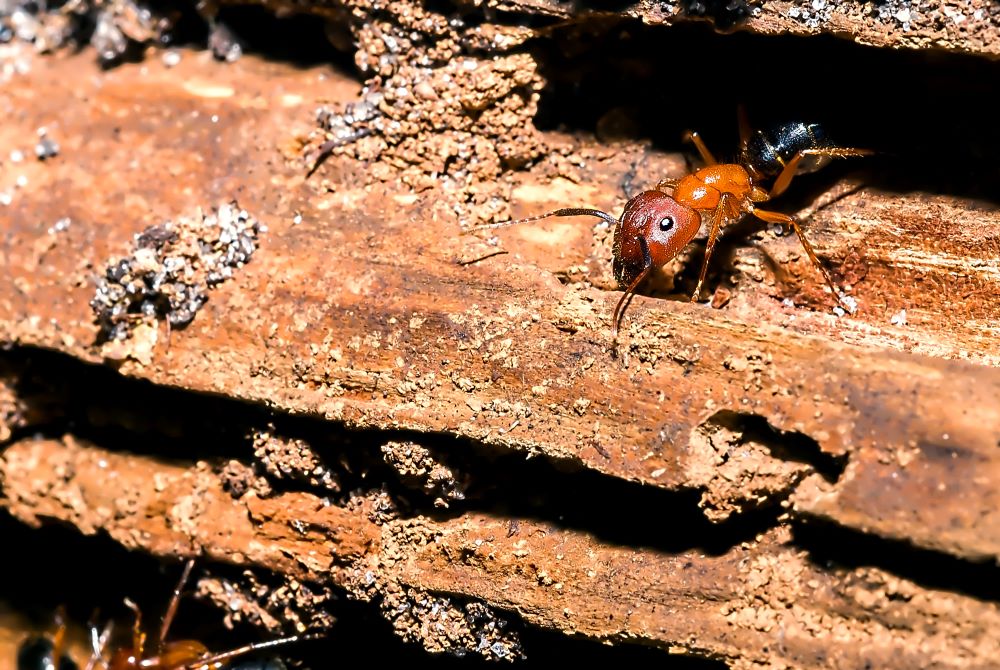
Carpenter ants just love to ruin wood: in houses, furniture, gardens, and any untreated lumber they can get their pincers on. While it’s not super likely, they can even chomp on you if you aren’t careful. Let’s look into what these specific bites can do to you, and how to take care of them safely.
Identifying carpenter ant bites
Carpenter ant bites are typically characterized by a small, red bump on the skin. Unlike mosquito bites, which tend to be itchy, carpenter ant bites may cause a sharp, stinging pain. The area around the bite may also become swollen and inflamed. It’s important to note that carpenter ant bites can often be mistaken for bites from other insects, so it’s crucial to look for other signs to confirm the presence of carpenter ants in your vicinity, such as the presence of sawdust-like debris or hollowed-out wood.
Symptoms of carpenter ant bites
Bug bites might not show up noticeably, but they can definitely be painful. Some people might feel a burning sensation near the bite, while others could have an allergic reaction. Allergic responses to carpenter ant bites can differ in intensity, from slight itching and redness to more serious issues like trouble breathing or swallowing. If you or someone you know has any of these severe symptoms, it’s important to get medical help right away.
Immediate first aid for carpenter ant bites
If a carpenter ant has bitten you, it’s crucial to act quickly to reduce discomfort and avoid infection. Begin by cleansing the area with gentle soap and water. Use a cold compress or ice pack wrapped in fabric to lessen swelling and numb the spot. You may also consider taking non prescription pain relievers like ibuprofen or acetaminophen for pain relief. Refrain from scratching the bite, as it could cause more irritation and raise the chances of infection occurring.
Natural remedies for relieving discomfort from bites
After administering initial first aid, there are a few natural solutions that can ease the discomfort from carpenter ant bites. Aloe vera gel, known for its calming effects, can be gently applied to the affected area to reduce pain and swelling. Making a paste from baking soda and water is another option to relieve itching and decrease inflammation. Tea tree oil is also effective due to its antimicrobial properties that help prevent infections. Mix a few drops of tea tree oil with coconut oil and apply it on the bite for relief.
Over-the-counter treatments for carpenter ant bites
If the natural remedies don’t provide sufficient relief, there are over-the-counter treatments available that can help alleviate the discomfort caused by carpenter ant bites. Antihistamine creams or lotions can be applied to reduce itching and inflammation. Calamine lotion, known for its soothing properties, can also provide relief. Additionally, hydrocortisone cream can help reduce itching and promote healing. It’s important to carefully follow the instructions on the packaging and consult a healthcare professional if you have any concerns or if the symptoms worsen.
Preventing carpenter ant bites
Prevention is better than cure when it comes to carpenter ant bites. To reduce the risk of being bitten by carpenter ants, it’s important to eliminate their presence in and around your home. Start by identifying and sealing any cracks or openings in your walls, windows, or doors that may serve as entry points for ants. Keep your living spaces clean and free of food debris, as ants are attracted to food sources. Store food in airtight containers and promptly clean up spills or crumbs. Regularly inspect and maintain wooden structures, as carpenter ants are drawn to moist or decaying wood.
When to seek medical attention
While most carpenter ant bites can be treated at home with the remedies mentioned earlier, there are instances when medical attention is necessary. Seek medical help if you experience severe allergic reactions, such as difficulty breathing, swelling of the lips or tongue, or dizziness. Additionally, if the bite area becomes increasingly painful, shows signs of infection (such as pus or red streaks), or does not improve within a few days, it’s best to consult a healthcare professional for further evaluation and treatment.
Myth vs. reality: Common misconceptions about carpenter ant bites
There are many misunderstandings about carpenter ant bites that should be clarified. One popular misconception is that carpenter ant bites contain venom. However, in truth, carpenter ants do not have venom and their bites are not toxic. Another misconception is that carpenter ants spread diseases through their bites. Although untreated carpenter ant bites can result in infections, they do not transmit diseases like mosquitoes or ticks. It’s crucial to distinguish between what’s true and what’s false to ensure accurate information when dealing with carpenter ant bites.
Conclusion
Carpenter ant bites sure can smart, but if you can identify the problem and treat it swiftly, you should be alright. Clean the wound, use a cold compress, and don’t be afraid to down an antihistamine for the swelling. And more importantly, don’t sleep on an infestation. They can seriously damage your home or business, as well as damage you!
Banner Pest Services is here to help you keep carpenter ants out of your business or home. Contact us today for a free quote!

